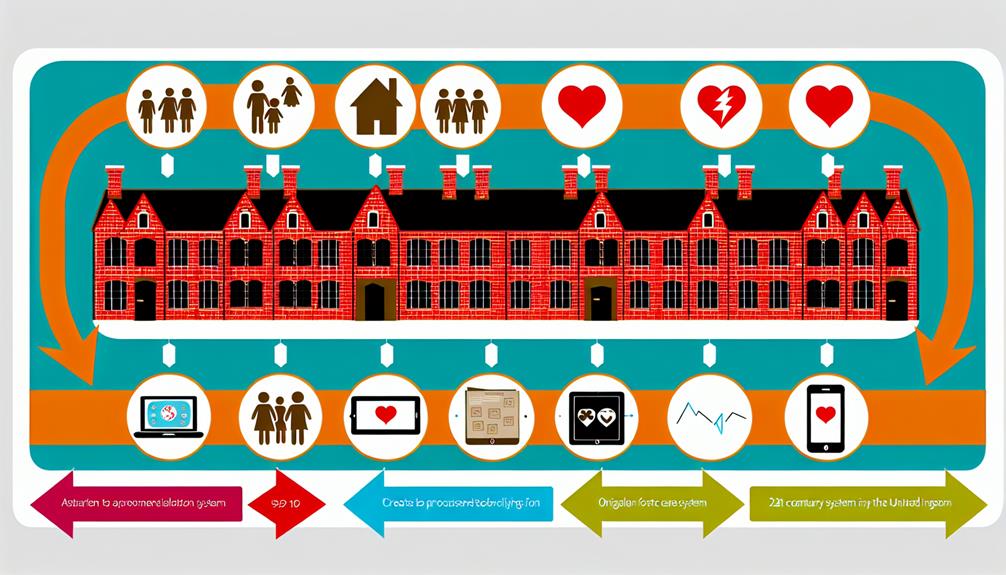Innovations are revolutionizing foster care in Britain. Legislative amendments like the Children and Social Work Act 2017 and Fostering Better Outcomes report are tackling challenges. Technological advancements such as AI algorithms for predictive analysis and mobile apps are improving efficiency. VR training for foster parents is becoming mainstream, ensuring better understanding and empathy towards children. Diversity is embraced like never before, accepting various races, religions, and family structures. This reshaping of the foster care landscape is redefining norms and setting new trends. There's more to explore in this fascinating evolution.
Key Takeaways
- Digital tools for screening have streamlined data storage and assessment, with AI algorithms for predictive analysis.
- Virtual reality training provides simulated experiences, enhancing understanding of foster children and caregiver learning.
- Foster care mobile apps have been developed for improved efficiency, although they present challenges such as digital literacy and security concerns.
- Recent legislative amendments, such as the Children and Social Work Act 2017 and the Fostering Better Outcomes report 2018, have transformed the foster care system.
- Data-driven approaches, utilizing predictive analytics, are being used to provide proactive care, identify areas of need, and drive forward-thinking strategies.
The Evolution of UK Foster Care

Let's explore the evolution of UK Foster Care, a journey that has seen significant transformations over the years. Initially, the system was mainly white, middle-class, and conventional. Over time, however, the necessity of 'Foster Family Diversity' became evident. This shift wasn't only demographic but also ideological, embracing different races, religions, sexual orientations, and family structures. Single parents, same-sex couples, and individuals of diverse ethnic backgrounds have all been welcomed into the fostering family.
The increased diversity isn't merely an essential gesture but a significant step towards providing a homely environment for every child in need, regardless of their unique backgrounds and experiences. Alongside diversity, the 'Attachment Theory Implementation' has gained prominence, an important psychological framework that prioritises stable, loving relationships over mere physical care.
The attachment theory, developed by John Bowlby, posits that a strong emotional bond with caregivers during childhood is important for future emotional wellbeing. By implementing this theory, UK Foster Care has shifted its focus from providing temporary care to fostering long-term emotional bonds. These changes reflect a more compassionate, inclusive, and psychologically informed approach, tremendously improving both the quality and impact of UK Foster Care.
Technological Innovations in Foster Care
Now, let's turn your attention towards how technology is reshaping foster care in Britain.
You'll notice the emergence of digital tools for screening, virtual reality training, and innovative mobile apps within this sector.
These advancements not only streamline processes but also enhance the overall experience for carers and children alike.
Digital Tools for Screening
In the domain of foster care, a myriad of digital tools have been recently introduced to streamline the screening process, greatly enhancing efficiency and effectiveness. This digital empowerment plays a pivotal role in enhancing screening efficiency. Here's how:
- Data Management Systems: They aid in the efficient storage, retrieval, and analysis of data related to foster care applicants.
- Online Assessments: Foster care applicants can undergo assessments online, reducing time and resources.
- AI Algorithms: They help in predictive analysis, identifying potential risks or strengths in applicants.
- Digital Portals: A single platform where applicants, foster care agencies, and social workers can interact, share information, and monitor progress.
These tools not only streamline the process but also ensure a thorough, unbiased evaluation of applicants.
Virtual Reality Training
Moving beyond digital tools for screening, another technological innovation making a significant impact in foster care is virtual reality training. The increased VR equipment accessibility allows foster parents to experience simulations that replicate the challenges foster children often face. It's a powerful tool with therapeutic potentials, aiding understanding and empathy.
| Advantages | Description |
|---|---|
| VR Equipment Accessibility | Affordable and easy to use, VR equipment is now readily available. |
| Simulated Experiences | VR provides realistic, immersive experiences, facilitating better understanding of children's circumstances. |
| Therapeutic Potentials | VR aids in developing empathy, an important aspect in foster care. |
| Training Efficiency | VR training is time-efficient and interactive, making it an effective learning tool. |
You'd agree, this innovation is transforming the way foster care operates in Britain. It's a promising step towards improving the welfare of foster children.
Foster Care Mobile Apps
Harnessing the ubiquity of smartphones, foster care mobile apps are emerging as the next innovative tool to enhance the foster care system in Britain. These apps are developed to address various foster care needs, yet their adoption isn't without challenges.
- Foster App Development: These apps bring efficiency and effectiveness, aiding in tasks like tracking placement history and sharing critical information among relevant parties.
- App Adoption Challenges: Despite their potential benefits, adoption can be slow due to issues like digital literacy and data security concerns.
- Training and Support: Providing adequate training and ongoing support for users is crucial to maximise the benefits.
- Continuous Improvement: Based on user feedback, ongoing improvement ensures the apps remain relevant and user-friendly.
Adopting these apps could revolutionise foster care in Britain.
Policy Changes Impacting Foster Care
Let's now turn your attention to the recent policy changes in the British foster care system.
You must consider the legislative amendments that have been implemented and their subsequent impacts on caregivers.
This analysis will provide you with a thorough understanding of how policy alterations are reshaping foster care in Britain.
Recent Legislative Amendments
In recent years, significant legislative amendments have reshaped the landscape of foster care in Britain, requiring your attention to comprehend their impact. These changes have closed legislation loopholes and strengthened children's rights.
To provide a clearer picture, let's break it down:
- The Children and Social Work Act 2017 expanded corporate parenting principles, mandating all local authorities to prioritize children's well-being.
- The Fostering Better Outcomes report in 2018 highlighted the need for a national recruitment strategy, addressing the shortage of foster carers.
- The Independent Review of Children's Social Care proposed in 2021 aims to transform children's experiences.
- The ongoing review of The Care Act 2014 intends to enhance support for care leavers.
These shifts are driving a revolution in British foster care, offering hope for more effective and compassionate systems.
The Impact on Caregivers
While you might expect these policy changes to solely affect the children in foster care, they've had profound implications for the caregivers as well. Dealing with caregiver burnout has become a key focus, with policies now addressing the need for regular respite care and improved support networks. These changes aim to bolster emotional resilience among caregivers.
The introduction of targeted training programs is equipping caregivers with critical coping strategies to manage the often intense emotional demands of their role. While these innovations are still being fully implemented, early reports indicate a positive impact, reducing instances of burnout and enhancing overall caregiver wellbeing.
Consequently, these policy changes aren't only transforming the lives of children but also those who care for them.
Training Reforms for Foster Parents

Have you considered how recent training reforms are transforming the way foster parents in Britain are prepared for their crucial role? These innovations aren't just changing foster care, but are enhancing both parental resilience and emotional intelligence.
Here's a snapshot of these changes:
- Parental Resilience Training: This equips foster parents with the ability to bounce back from stress and adversities. They're taught coping strategies and resilience techniques to manage the unique challenges that come with fostering.
- Emotional Intelligence Training: An essential reform, teaching foster parents how to recognize, understand, and manage their emotions and those of their foster children. This is key in creating harmonious environments.
- Crisis Intervention Training: This prepares parents to handle difficult situations, from behavioral issues to emotional distress. It's about promoting stability and security within the foster home.
- Cultural Competence Training: This ensures foster parents can provide care which respects and appreciates the child's cultural, racial and individual identities.
These reforms are revolutionizing the way foster parents are trained, making sure they're equipped with the tools necessary to provide stable, nurturing environments. They're essential in shaping the future of foster care in Britain.
Data-Driven Approaches in Foster Care
Britain's foster care system is harnessing the power of data to drive improvements and deliver better outcomes for children. Using predictive analytics, the system is now able to anticipate and respond to potential issues before they escalate, enabling a more proactive approach to care.
Data on foster demographics is being used to pinpoint areas of need, identify trends, and strategise more effectively. You'll see this in the way resources are allocated, or how support is tailored to individual circumstances. It's also helping to uncover valuable insights into the factors that contribute to successful placements, and those that may lead to disruption.
But, it's not just about reactive measures. Data is also instrumental in shaping forward-thinking strategies that aim to strengthen the system as a whole. By analysing patterns and relationships in the data, it's possible to predict future demand, inform policy decisions, and ultimately create a more robust, resilient foster care system.
Sure, there are challenges – data privacy, accuracy, and interpretation to name a few. But as these hurdles are overcome, you can expect to see data-driven approaches playing an increasingly pivotal role in transforming foster care in Britain.
Enhancements in Foster Child Support

In addition to leveraging data, significant strides are being made in enhancing direct support for foster children in Britain. These improvements are largely centered around mental health support and financial aid implementation.
- Mental Health Support: There's an increased focus on providing thorough mental health support to foster children. This is being achieved through dedicated counseling services, therapy sessions, and the implementation of support groups. It's commonly recognized that these children often come from traumatic backgrounds and need robust mental health services.
- Financial Aid Implementation: The British government has been proactive in implementing financial aid for foster children. This aid is designed to cover their basic needs, educational expenses, and to guarantee their overall well-being.
- Education and Training for Foster Parents: Foster parents are being given extensive training to better understand and support the unique needs of their foster children. This includes training in mental health awareness and financial planning.
- Improved Case Management Systems: New innovations in case management systems allow for better tracking of each child's progress, needs, and the effectiveness of their support structures.
In essence, the transformational changes in foster child support are aimed at nurturing the holistic development of foster children, setting them up for a brighter, more stable future.
Future Prospects of UK Foster Care
Looking ahead, you'll find a promising landscape for the future of UK's foster care system, teeming with potential advancements and opportunities. Foster care sustainability is at the forefront, with new models of care being developed that aim to provide stable, long-term solutions for children in need. These innovative approaches are expected to reduce the number of placements a child experiences, enhancing their wellbeing and life outcomes.
The financial implications of these advancements shouldn't be overlooked. Investment in robust, sustainable foster care systems should yield significant savings in the long run, reducing the cost of crisis interventions, mental health services, and criminal justice involvement. It's a shift towards spending money more effectively, not just more.
Furthermore, advancements in digital technology will likely introduce efficiencies in the system, improving matching processes between children and foster parents, enhancing training and support for caregivers, and streamlining administrative tasks.
Frequently Asked Questions
What Is the Process of Becoming a Foster Parent in the Uk?
To become a foster parent in the UK, you'll undergo foster parent training and a home environment assessment. This process guarantees you're equipped with the necessary skills and your home is suitable for fostering.
How Are Foster Children Matched With Foster Families?
In Britain, you're paired with foster children through a comprehensive process ensuring Child Parent Bonding and Foster Placement Stability. It involves evaluating compatibility, needs and lifestyle to create lasting, beneficial relationships for both parties.
What Are the Financial Implications for Foster Parents?
As a foster parent, you'll encounter financial implications. Tax deductions for foster parenting can ease this burden. Additionally, financial training is now integral to foster care, helping you manage these costs effectively.
What Are the Emotional and Psychological Effects on Children in Foster Care?
You'll often find that foster children exhibit disrupted attachment patterns, which may lead to psychological distress. However, trauma healing techniques are revolutionizing their recovery, facilitating healthier emotional relationships and improved mental well-being.
What Kind of Post-Care Support Do Foster Children Receive in the Uk?
In the UK, you'll find robust support networks and education opportunities for foster children post-care. They're not left adrift, but given the tools to navigate life's choppy waters successfully.
Conclusion
So, you see, Britain's foster care system is no longer entrenched in the past. Innovations in technology, policy, training, and data analysis have dramatically transformed the landscape.
These changes aren't just shaping the lives of foster parents, but also providing enhanced support to foster children.
Essentially, the future of UK foster care seems brighter than ever, filled with endless possibilities and opportunities for improvement. Aren't you excited to see where this journey leads?




